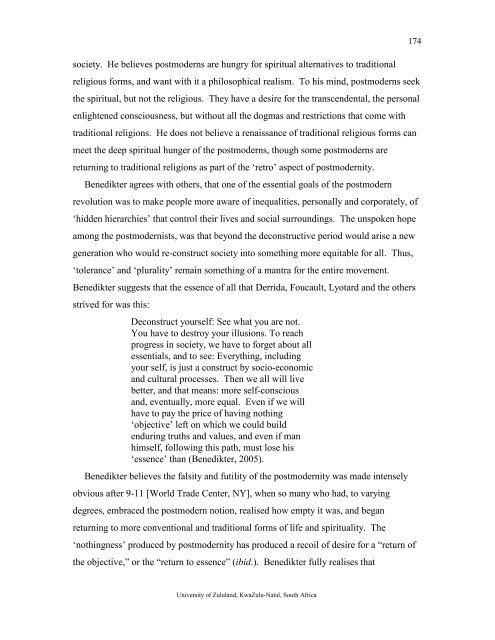Haase_UZ_x007E_DTh (2).pdf - South African Theological Seminary
Haase_UZ_x007E_DTh (2).pdf - South African Theological Seminary
Haase_UZ_x007E_DTh (2).pdf - South African Theological Seminary
Create successful ePaper yourself
Turn your PDF publications into a flip-book with our unique Google optimized e-Paper software.
society. He believes postmoderns are hungry for spiritual alternatives to traditional<br />
religious forms, and want with it a philosophical realism. To his mind, postmoderns seek<br />
the spiritual, but not the religious. They have a desire for the transcendental, the personal<br />
enlightened consciousness, but without all the dogmas and restrictions that come with<br />
traditional religions. He does not believe a renaissance of traditional religious forms can<br />
meet the deep spiritual hunger of the postmoderns, though some postmoderns are<br />
returning to traditional religions as part of the ‘retro’ aspect of postmodernity.<br />
Benedikter agrees with others, that one of the essential goals of the postmodern<br />
revolution was to make people more aware of inequalities, personally and corporately, of<br />
‘hidden hierarchies’ that control their lives and social surroundings. The unspoken hope<br />
among the postmodernists, was that beyond the deconstructive period would arise a new<br />
generation who would re-construct society into something more equitable for all. Thus,<br />
‘tolerance’ and ‘plurality’ remain something of a mantra for the entire movement.<br />
Benedikter suggests that the essence of all that Derrida, Foucault, Lyotard and the others<br />
strived for was this:<br />
Deconstruct yourself: See what you are not.<br />
You have to destroy your illusions. To reach<br />
progress in society, we have to forget about all<br />
essentials, and to see: Everything, including<br />
your self, is just a construct by socio-economic<br />
and cultural processes. Then we all will live<br />
better, and that means: more self-conscious<br />
and, eventually, more equal. Even if we will<br />
have to pay the price of having nothing<br />
‘objective’ left on which we could build<br />
enduring truths and values, and even if man<br />
himself, following this path, must lose his<br />
‘essence’ than (Benedikter, 2005).<br />
Benedikter believes the falsity and futility of the postmodernity was made intensely<br />
obvious after 9-11 [World Trade Center, NY], when so many who had, to varying<br />
degrees, embraced the postmodern notion, realised how empty it was, and began<br />
returning to more conventional and traditional forms of life and spirituality. The<br />
‘nothingness’ produced by postmodernity has produced a recoil of desire for a “return of<br />
the objective,” or the “return to essence” (ibid.). Benedikter fully realises that<br />
174<br />
University of Zululand, KwaZulu-Natal, <strong>South</strong> Africa

















